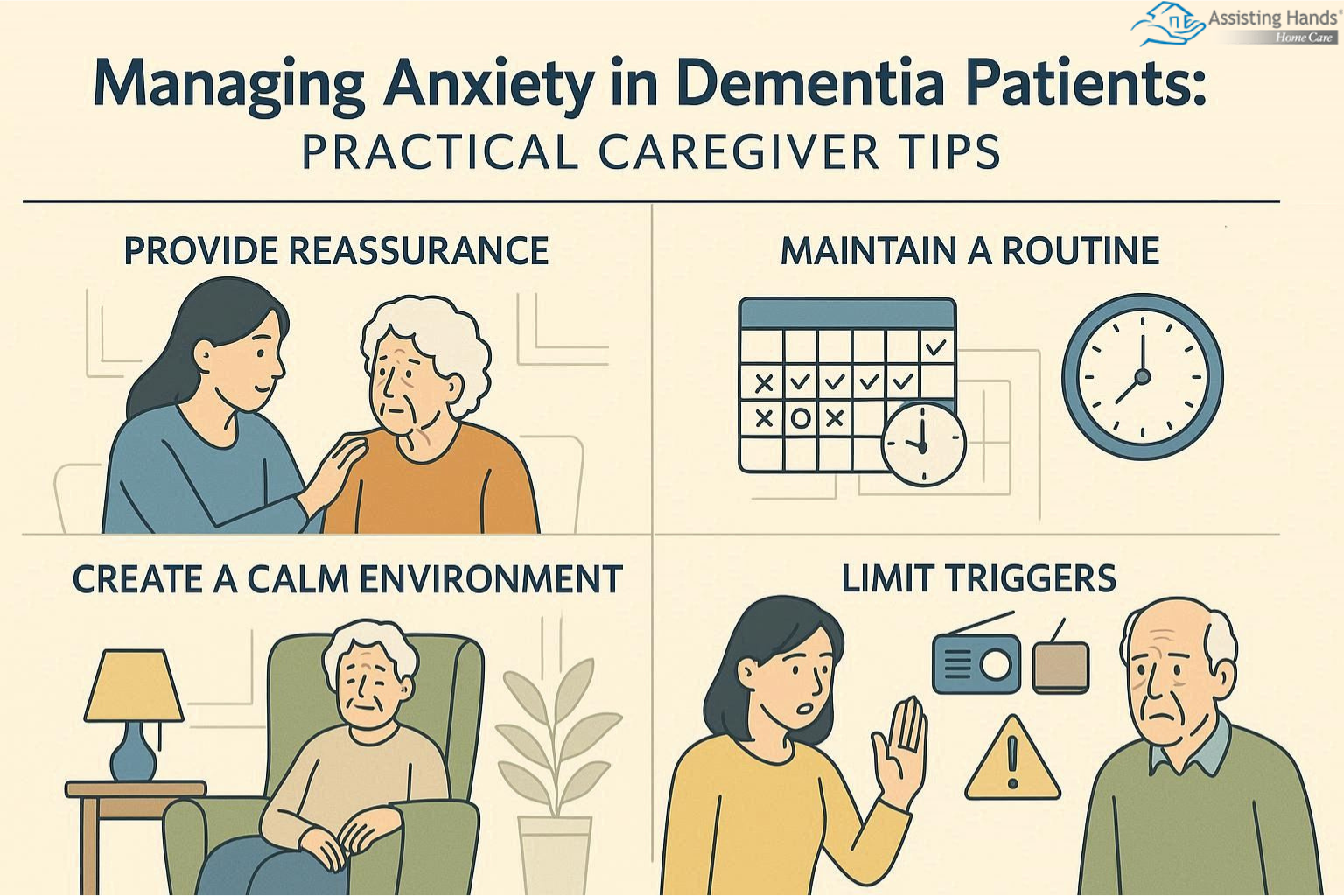
Table of Content
Anxiety commonly affects seniors with dementia, creating distressing symptoms that can significantly impact their quality of life and daily functioning. Understanding effective strategies to manage anxiety in dementia patients helps caregivers provide better support while creating calmer, more comfortable environments for their loved ones.
Create a Consistent Daily Routine
Establishing predictable daily routines reduces anxiety by providing structure and familiarity for dementia patients. When activities occur at the same times each day, it creates a sense of security and reduces confusion about what comes next.
Effective routine strategies include:
- Maintaining consistent mealtimes, bedtime, and wake-up schedules
- Following the same sequence for daily activities like bathing and dressing
- Using visual cues such as calendars or picture schedules to reinforce routines
- Allowing flexibility within the structure to accommodate changing needs and abilities
Simple modifications to the daily schedule can make significant differences. For example, scheduling more challenging activities during times when your loved one typically feels most alert can reduce frustration and associated anxiety.

Modify the Environment for Comfort
Environmental factors play a crucial role in managing anxiety levels for dementia patients. Creating a calm, familiar space minimizes triggers that can escalate anxious feelings and behavioral responses.
Consider these environmental modifications:
- Reduce noise levels by turning off televisions or radios when not actively being used
- Ensure adequate lighting throughout the day to prevent shadows and confusion
- Remove or secure items that might pose safety risks and increase worry
- Display familiar photos and meaningful objects that provide comfort and recognition
- Maintain comfortable room temperatures and ensure proper ventilation
Personal items from earlier life stages often provide significant comfort. Family photographs, favorite blankets, or cherished mementos can serve as grounding tools during anxious moments.
The cognitive challenges that accompany dementia often leave aging adults unable to manage everyday tasks, which puts their safety and health at risk. If your senior loved one has been diagnosed with a serious condition and needs help with tasks like meal prep, transportation, bathing, and grooming, reach out to Assisting Hands Home Care, a leading provider of home care service families can trust. We also offer comprehensive care for seniors with dementia, Alzheimer’s, and Parkinson’s.
Use Effective Communication Techniques
How caregivers communicate directly influences anxiety levels in dementia patients. Adopting communication approaches that validate feelings while providing reassurance can significantly reduce distressing symptoms.
Helpful communication strategies include:
- Speaking slowly and clearly using simple, concrete language
- Maintaining calm, reassuring vocal tones even during challenging moments
- Validating emotions rather than correcting confused statements or memories
- Offering choices between two simple options to maintain a sense of control
- Using gentle touch or physical presence to provide comfort when appropriate
Avoiding arguments or lengthy explanations prevents escalating anxiety. Instead, acknowledge your loved one’s feelings and redirect attention toward comforting activities or familiar topics.
Implement Calming Activities and Techniques
Engaging dementia patients in soothing activities can effectively redirect anxious energy while providing positive experiences. Different individuals respond to various calming approaches, so experimenting with multiple techniques can help you identify what works best for your loved one.
Effective calming activities include:
- Playing familiar music from your loved one’s younger years
- Engaging in gentle physical activities like walking or simple stretching
- Providing tactile stimulation through soft fabrics, worry stones, or fidget items
- Looking through photo albums or memory books together
- Practicing deep breathing exercises or simple meditation techniques
Timing these activities strategically can prevent anxiety from escalating. Recognizing early signs of agitation and intervening with calming techniques often prevents more severe episodes.
Symptoms such as agitation, confusion, anxiety, and frustration are common in elderly people with dementia. Seniors can face a variety of age-related challenges. Though some families choose to take on the caregiving duties, there may come a time when they need a trusted Annapolis elderly home care provider. Families sometimes need respite from their duties so they can focus on their other responsibilities, and some seniors need around-the-clock assistance that their families are not able to provide. Assisting Hands Home Care is here to help.
Know When to Seek Professional Support
While many anxiety management strategies can be implemented at home, certain situations require professional medical attention. Healthcare providers can assess whether medications or specialized interventions might be beneficial for managing severe anxiety symptoms.
Consider consulting healthcare professionals when:
- Anxiety symptoms significantly interfere with daily activities or sleep patterns
- Behavioral responses become aggressive or potentially dangerous
- Traditional calming techniques no longer provide relief
- Physical symptoms accompany anxiety, such as rapid heartbeat or difficulty breathing
- You feel overwhelmed or unable to manage the situation effectively
Professional support might include medication adjustments, occupational therapy recommendations, or referrals to specialized dementia care programs that offer additional resources and expertise.
Regular communication with healthcare providers ensures anxiety management approaches remain effective as dementia progresses and needs change over time.
Certain age-related conditions can make it more challenging for seniors to age in place safely and comfortably, but Annapolis live-in care experts are available around the clock to help seniors manage their health. Whether your loved one is living with dementia or recovering from a stroke, you can trust the professional caregivers from Assisting Hands Home Care to enhance his or her quality of life. Reach out to one of our Care Specialists today to schedule a free in-home consultation.
